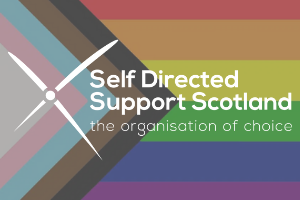LGBT+ People’s Experiences of SDS
This LGBT+ History Month (February 2021), it’s important we recognise LGBT+ people’s experiences of Self-directed Support (SDS) and how to improve them.
My Support, My Choice
As part of our ‘My Support, My Choice’ research project, we heard from a range of disabled people and people living with long term conditions who are LGBT+.
Accessing support
People reported that recruiting Personal Assistants and working with new support workers could be more difficult for LGBT+ people. One person spoke of their awareness that some people would not be accepting of their sexual orientation, and the difficulties in knowing whether care workers would treat them appropriately if they disclosed their sexuality.
Community
One interviewee reflected on the difficulties of being LGBT+ and disabled in a rural area, with restricted opportunities to meet partners or people who they knew would be accepting of their sexuality. They highlighted the need for more accessible LGBT+ events and venues for people of all ages, stating:
“In the general, that there’s not that much in [specific locations] for LGBT people. And if there is, then it’s at the college, […] you’ve got to be a student. There’s no way around about it. You’ve […] got to be a student at the college to attend LGBT events.”
Some people spoke positively of the support they had received from their social workers. One interviewee sought help from their social worker in finding accessible LGBT+ events and support groups in their local area and praised their efforts to help them. This example of good practice is in keeping with recommendations and findings from a report from Stonewall/University of Bristol, which stated that “there is a need for more targeted support and information for LGBTQI+ Disabled People as well as more information for their PAs”.
LGBT at home
It was reported that some disable LGBT+ people’s families’ reactions to their sexual orientation were directly linked to their need to access SDS and housing support, as they were made homeless after coming out to family members. Once homeless, it was frequently more difficult for people to access SDS – not least because of the difficulties in providing a fixed address. LGBT+ people should not experience discrimination or inequality due to their identity when accessing social care. SDS assessments should take a whole person approach and incorporate sexual orientation and gender identity.
Recommendations
My Support, My Choice made recommendations for improvement in the review and reform of SDS/ social care:
- Targeted work is required to ensure that LGBT+ people do not experience stigma, discrimination or inequality when accessing SDS/ social care.
- Social work professionals should be given training on how to support disabled LGBT+ people with targeted support and information if required, and local support groups should be appropriately funded.
Next steps
SDSS and research partner, the ALLIANCE, are engaging with the Scottish Government and membership organisations to act on the learnings from My Support, My Choice.
If you’d like to learn more about LGBT+ History Month, please click here.
For more information and advice about LGBT+ topics, check out Stonewall Scotland.

